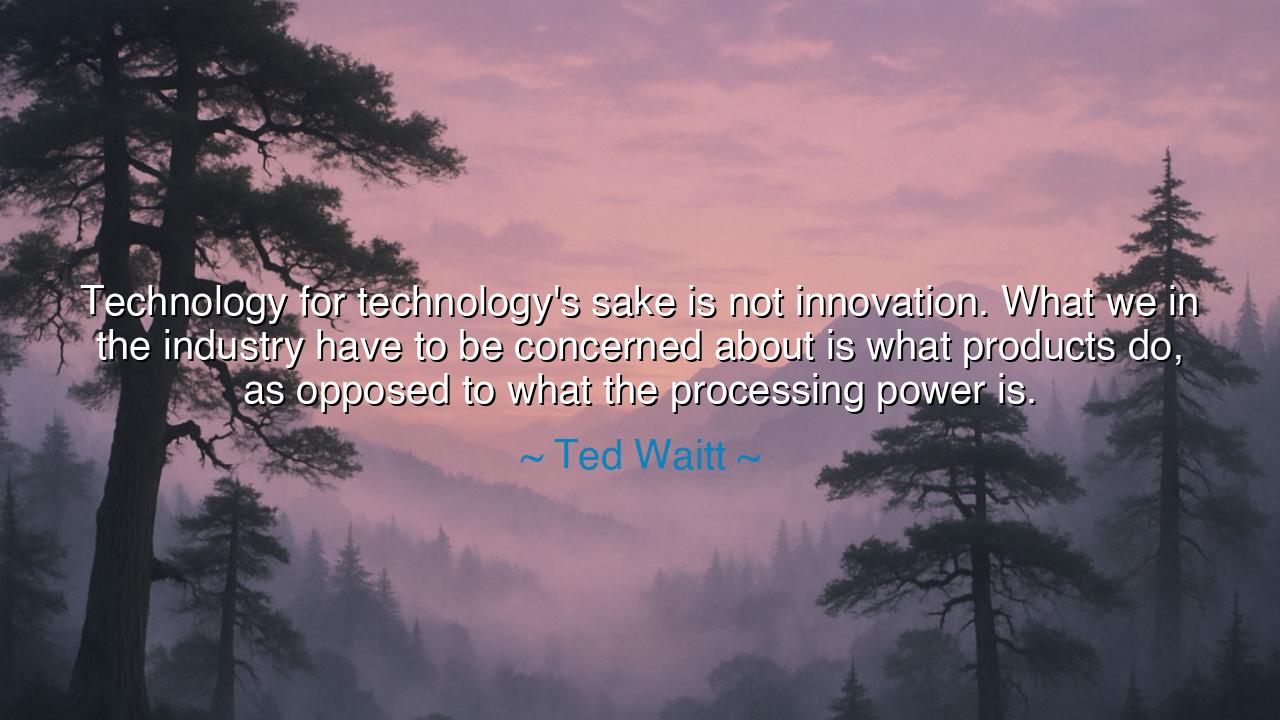
Technology for technology's sake is not innovation. What we in
Technology for technology's sake is not innovation. What we in the industry have to be concerned about is what products do, as opposed to what the processing power is.






The wise words of Ted Waitt, co-founder of Gateway Computers, echo like a warning bell to the builders of the modern age: “Technology for technology’s sake is not innovation. What we in the industry have to be concerned about is what products do, as opposed to what the processing power is.” In this declaration, he speaks not as a dreamer lost in the stars of circuitry, but as a craftsman who understands that the true purpose of technology is not its raw might, but the service it renders to humanity. For what is a blade that cuts nothing, or a vessel that sails nowhere? So too is technology meaningless if it dazzles but does not serve.
The ancients, though they knew not of silicon nor of processors, understood this truth well. The builders of aqueducts in Rome did not labor merely to test their stonecraft; they built to carry water — the lifeblood of civilization — to the homes and baths of the people. Their achievement was not in the height of arches or the complexity of mortar alone, but in the function those aqueducts fulfilled. This is what innovation means: to take the tools of the age and bend them toward solving real human needs. Waitt reminds us that it is the what and not merely the how fast that defines progress.
History gives us a tale of caution in the rise and fall of countless forgotten inventions. Consider the fate of the Concorde jet, a marvel of engineering that could cross oceans at supersonic speeds. Its processing power of engines and aerodynamics was beyond its time, yet it served too few, solved too little, and was burdened by impractical cost. It dazzled the world, but its glory faded, because the measure of true innovation is not spectacle, but usefulness. From this, we learn that speed, power, and technical beauty are hollow unless they connect with the lives of the many.
Ted Waitt’s voice comes from the battlefield of the computer industry in the 1990s, a time when companies boasted endlessly of megahertz and RAM, drowning the marketplace in a war of numbers. Yet the people did not hunger for numbers alone; they hungered for what the machine could do. Could it connect them to the wider world? Could it write their letters, store their memories, help them labor with greater ease? Those who saw only the arms race of processing power fell, while those who understood the call of human need endured. Here lies the secret of why companies rose or perished in that age.
This teaching reaches beyond the walls of technology. It speaks to every craft, every discipline. A painter who delights only in pigments but never in the truth his canvas conveys has not created art. A teacher who amasses endless facts without stirring the heart of the student has not created learning. A leader who builds armies but not peace has not created greatness. In every field, purpose must triumph over mere performance. The essence of true innovation is not in the tool, but in its ability to change life for the better.
The lesson for those who walk the path of invention is this: focus not on the power of the machine, but on the empowerment of the human. Ask always, what does this creation do? Whom does it serve? What need does it fulfill? Let the brilliance of engineering be yoked to compassion, let the speed of processors be bound to vision, and let the grandeur of design bow to the humble service of mankind. Only then will the builder’s work endure beyond its time.
Therefore, O children of the future, heed the wisdom of Ted Waitt. Do not be intoxicated by the glow of mere technical might. Do not chase the vanity of technology for technology’s sake. Instead, direct your hands and minds to create tools that heal, connect, uplift, and empower. For only when technology bends to the service of humanity does it earn the name innovation. And only then will your work be remembered as more than power — it will be remembered as progress.






AAdministratorAdministrator
Welcome, honored guests. Please leave a comment, we will respond soon